Colorado voters delivered a mixed bag of results on this year’s ballot with Democrats and Republicans both having wins and loses, and libertarian activists have opportunity in front of them.
Although the Presidential election receives more coverage, the decisions of voters at the local level have a more direct impact on the lives of Coloradoans.
Colorado Democrats predicted a massive blue wave that would further extend their control of the State Government, but only picked up one seat.
The Colorado House maintained the status quo with Democrats losing one seat and picking up another to keep their 41 to 24 majority.
In the Colorado Senate, Democrats picked up one seat, expanding their majority to 20 to 15.
The biggest race in Colorado in 2020 was the US Senate seat occupied by incumbent Republican Cory Gardner who lost to former Governor, and Denver Mayor John Hickenlooper.
Colorado saw record turnout, with Secretary of State Jena Griswold already bragging in fundraising emails that 87% of Colorado’s active voters participated in the 2020 election.
Coloradoans gained some freedoms, and lost others, but the results of the election should have libertarians optimistic about the potential for a freer Colorado.
I hope this analysis will help liberty-minded Colorado activists.
This is Part 1, of a series.
Let’s start with the ballot initiatives:
Ballot Initiatives that Passed:
Residential Property Tax Increase – Amendment B – Yes: 57.52% No: 42.48%
With a vote difference of 455,109, this was a slam-dunk win for statists and a big loss for Colorado residents.

Amendment B was a very poorly worded initiative that misled Colorado voters into raising their property taxes.
And why was it misleading?
The actual language in the ballot initiative was as follows (bold added for emphasis):
“Without increasing property tax rates to help preserve funding for local districts that provide fire protection, police, ambulance, hospital, kindergarten through twelfth grade education, and other services, and to avoid automatic mill levy increases, shall there be an amendment to the Colorado constitution to repeal the requirement that the general assembly periodically change the residential assessment rate in order to maintain the statewide proportion of residential property as compared to all other taxable property valued for property tax purposes and repeal the nonresidential property tax assessment rate of twenty-nine percent?”
Source: https://leg.colorado.gov/sites/default/files/documents/2020A/bills/2020a_scr001_enr.pdf
Of course, many voters read the first four words, skimmed the rest, and probably thought, “Sure, why not? My tax rates aren’t going to increase!”
However, Colorado residential property owners will pay MORE TAXES with Amendment B’s passage.
According to the Colorado Legislative Council Staff:
“…this measure will result in a higher residential assessment rate. A higher assessment rate will result in higher property tax revenue for local governments…”
Source: https://leg.colorado.gov/sites/default/files/documents/2020A/bills/fn/2020a_scr001_f1.pdf
Of course, libertarians and those who understand economics would have inferred from the ballot language, that actual tax dollars paid would increase under this initiative, TANSTAAFL!
There was also controversary over the wording of Amendment B, which even led to a lawsuit brought by Protect Our Homes Colorado, who rightly claimed that Colorado Legislators rewrote the “non-partisan” Blue Book language to create “propaganda for the yes vote.”
Interestingly enough, the lawsuit was rejected by Colorado Judge Martin F. Egelhoff, because his jurisdiction does not allow interference over legislative functions.
With Amendment B’s win, Colorado residents will see higher taxes, and just how much higher?
Glen Weinberg wrote in ColoradoBiz Magazine:
With the passage of amendment B, in 2021 (a revaluation year as Colorado values properties every odd year) there is going to be quite the sticker shock on tax bills as residential values have gone up close to 40% in the last two years in Denver and throughout most of the mountain communities.
This could mean a 164% to 185% tax increase over the next three years for Denver homeowners, meaning an increase of $2,400 per year minimum, according the Weinberg’s article!
The Gallagher Amendment, which Amendment B modified, admittedly had issues, but in a year when Coloradoans are already struggling to pay their rent, this massive tax increase will make Colorado less affordable.
The one benefit of Amendment B, will be much needed property tax relief for Colorado’s commercial property owners.
Out-of-State corporations who own commercial property in Colorado were big winners with Amendment B.
Yes on Amendment B, an issue committee, spent nearly $7 million to get this measure passed. (Yes on Amendment B’s website)
And where did all these millions of dollars come from?
Big Spenders on this Initiative:
Fort Collins billionaire, medical equipment heiress, and Gang of Four member, Pat Stryker contributed a whopping $2,250,000.
She can afford to pay higher property taxes with her net wealth increasing at an estimated $1 billion this year!
Another Healthcare “philanthropist,” former Davita CEO, and Cherry Hills resident Kent Thiry contributed $2,125,000 to support Amendment B.
Thiry previously supported Proposition 107 (allowing open Presidential primaries) and Proposition 108 (allowing unaffiliated voters to participate in party primaries) in 2016, and Amendment Y (creating an independent commission for Congressional redistricting) and Amendment Z (creating an independent commission for Colorado Legislative redistricting) in 2018. (source)
Other big donors included, Gary Community Investments ($1,250,000), headed by anti-gun former Democratic State Senator and failed former Governor candidate Mike Johnston, and James M. Walton ($100,000), of the Walmart family, who is using his inheritance to fund his Wend social impact fund (focused on education, and recently, social justice causes).
Libertarian take-away: Bad for Liberty. Property taxes will increase, and may increase tremendously, beyond what the proponents of this bill expected, leading to severe economic distress, giving activists an opportunity to push for lower taxes.
Green Counties are Where Amendment B Won, and Red is Where it Lost:

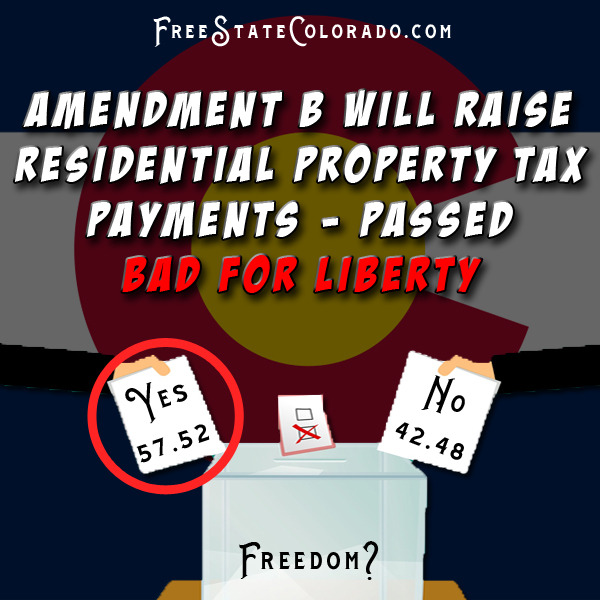
Only a Citizen can Vote – Amendment 76 – Yes: 62.9% No: 37.1%
With an advantage of 813,907 votes, 76 passed with much more than the needed 55% threshold to amend the Colorado Constitution.

The Colorado State Constitution will now be amended to require “that to be qualified to vote in any election an individual must be a United States citizen.”
This amendment seems to have little to no effect on how Coloradoans will vote, changing the language in the Colorado Constitution from “every citizen” to “only a citizen.”
However, Amendment 76 may be setting the stage for ID requirements for voting in Colorado elections.
Big Spenders on this Initiative:
The fear of Voter ID laws may be why the ACLU of Colorado spent over $5,000 opposing this amendment.
The primary spender in support of this Amendment was CITIZEN VOTERS INC. 501-C-4 out of Ponte Vedre Beach, Florida, who spent over $1.4 million to get this on the ballot and into law.
Time will tell.
Libertarian Take-away: Neutral for Liberty. Restricting the voting pool can be a good or bad thing from a libertarian perspective. Activists should be aware of efforts to enact voter ID laws.
Green Counties are Where Amendment 76 Won, and Red Counties are Where it Lost:

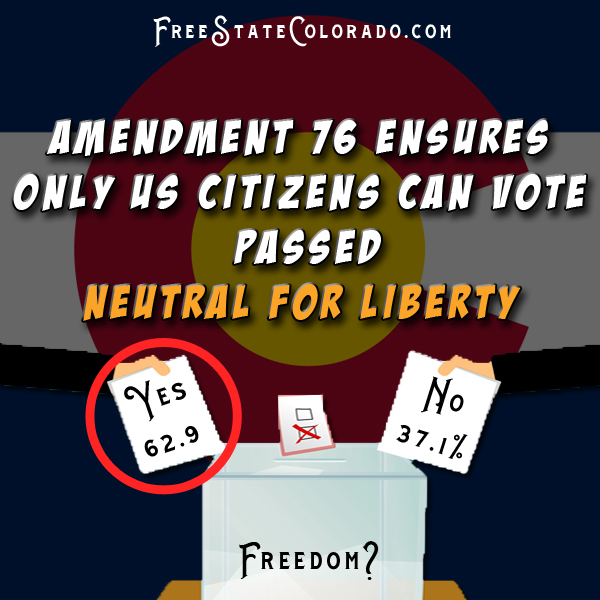
Expand Gambling Limits – Amendment 77 – Yes: 60.54% No: 39.46%
Another big margin with a 645,476 vote differential.

Amendment 77 now allows the voters of Central City, Black Hawk, and Cripple Creek the ability to “approve other games,” and “increase a maximum single bet to any amount.”
Unfortunately, 77 will direct gaming tax revenue to help fund community college programs.
This is a big win for Colorado’s casino industry!
Big Spenders on this Initiative:
And the gaming industry spent over $4,000,000 for this win.
Caesars Entertainment spent $1,100,000, Monarch Casino spent $950,000, and Penn National Gaming spending another $950,000, all in support of the measure. (source)
Higher bets and new games could attract more action to Colorado’s casinos.
Colorado’s gambling scene has seen massive growth with the advent of legal Sportsbook.
Gambling in Colorado is experiencing a surge, with over $200 million in September with legal Sportsbook, and 77 may help this industry achieve new heights.
Libertarian take-away: Good for Liberty. Gambling has been a winning issue in Colorado. Libertarian activists have an opportunity to spread liberty by loosening gambling laws.
Green Counties are Where Amendment 77 Won, and Red Counties are Where it Lost:

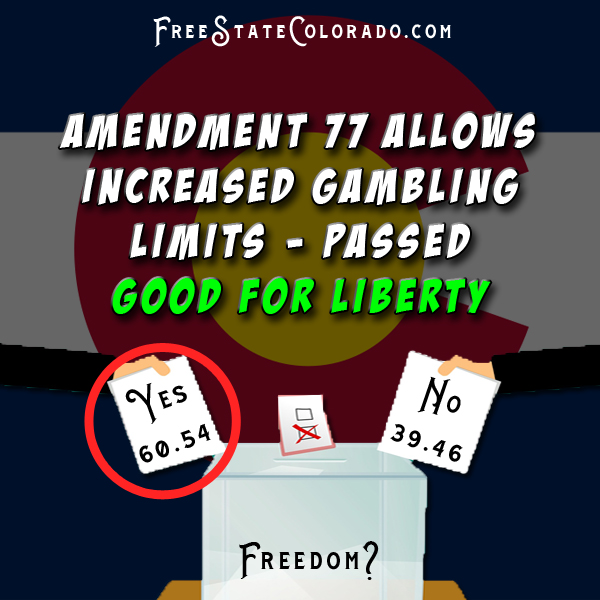
Outlaw Untaxed Vaping Sales & Increase Taxes on Tobacco – Proposition EE – Yes: 67.56% No: 32.44%
With a resounding 1.1 million vote differential, Colorado voters outlawed untaxed vaping sales, and increased taxes on tobacco products.

Tobacco users are an easy target for tax increasing Statists, but EE will be devastating for small tobacco retailers.
In a year when the drug war seemed to be failing, EE escalated the war on tobacco, creating incentives for tobacco smuggling, and increased law enforcement scrutiny over tobacco sales.
See the previous Free State Colorado article on EE
EE is also the subject of a lawsuit.
Altira, the parent company of Phillip Morris helped write the ballot language, and small tobacco companies accuse Altira of back-room deals that will ultimately benefit the major tobacco companies at the expense of the smaller tobacco companies.
Large corporations in 2020 are seeming to reap massive financial benefits, while smaller businesses fall by the wayside.
The outcome of EE will mean a great opportunity for tobacco smugglers, who will have an incentive to bring low-priced tobacco products into Colorado.
Not only is EE an evil attempt to social engineer the behavior of individuals to stop smoking, but even worse, the stolen tax money will be used for gov’t indoctrination preschools.
Colorado Governor Jared Polis has had a goal of indoctrinating children early, now the State will get their hands on children as young as four years old.
This is another great reason to homeschool your children!
Big Spenders on this Initiative:
The ridiculously named Save the Children Action Network (SCAN), out of Washington D.C., spent $260,000 in support of this effort.
This D.C. money went to Brighter, Healthier Future for CO’s Kids Campaign.
Brighter, Healthier, is a Rachel Gordon group, which we will see more of later.
Brighter, Healthier spent an incredible $4.5 million in support of EE!
$1.25 million came from Gary Community Investment, $624,000 from Healthier Colorado, and $105,000 from Children’s Funding Accelerator. (source)
Libertarian take-away: Bad for Liberty. Activists can look to tobacco businesses and those in the tobacco community in Colorado for allies against the State. As taxes increase, tobacco smuggling becomes more likely, which means police action against individuals skirting the ridiculous laws (like Eric Garner) is likely to increase. Libertarian activists should watch for these instances.
Green Counties are Where Proposition EE Won, and Red Counties are Where it Lost:

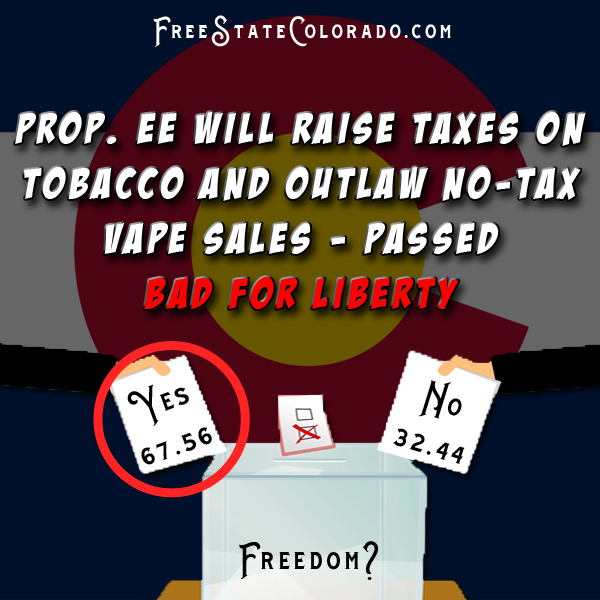
National Popular Vote – Proposition 113 – Yes: 52.33% No: 47.67%

113 passed with 146,193 votes in favor.
The Electoral College has been a confusing subject for many Americans.
When voters selected their preferred Presidential candidate on the November ballot, they were actually voting for Electors, who vote for their party’s candidate in December’s electoral college vote.
In 2019, the Democrat-controlled Colorado Legislature, and Jared Polis passed into law Senate Bill 19-042 which pledges Colorado’s electors to the winner of the national popular vote.
The elimination of the Electoral College has long been a goal for Democrats, and especially more so after the election of Donald Trump in 2016.
Proposition 113 was validation for Colorado’s Democratic Legislators who passed SB 19-042.
Colorado is one of 32 states where the party’s electors are bound to vote for their party’s candidate during the Electoral College vote (currently scheduled for December 14th, 2020).
Colorado has recently faced issues with “Faithless Electors,” but this issue was recently settled in the Supreme Court this past June.
The argument against the National Popular Vote plan is that it shifts our form of government from a Republic to a Democracy, and from a Union of States to a National Government.
The passage of 113 means that Colorado’s electors are pledged to vote for the candidate who receives the highest total number of votes, regardless of whether that candidate wins Colorado or not.
Rob Natelson of Denver’s Independence Institute explains some of the problems with the National Popular Vote’s Constitutionality:
First, NPV abandons the idea that presidential electors represent the people of their own states. Second, it discards an election system balanced among interests and values in favor of one recognizing only national popularity. That popularity need not be high: A state joining the NPV compact agrees to assign its electors to even the winner of a tiny plurality in a multi-candidate election.
Third, because NPV states would have a majority of votes in the Electoral College, NPV would effectively repeal the Constitution’s provision for run-off elections in the House of Representatives.
Fourth, NPV requires each state’s election officer to apply the vote tabulations certified by other state election officers—even if those tabulations are known to be fraudulent or erroneous. Indeed, NPV would give state politicians powerful incentives to inflate, by fair means or foul, their vote totals relative to other states.
Source: https://i2i.org/why-the-national-public-vote-scheme-is-unconstitutional/
113’s passage is an assault on our Constitution.
Big Spenders on this Initiative:
Three separate political committees supported this proposition:

Coloradoans for National Popular Vote spent $6,200, whereas Yes on National Popular Vote spent a whopping $4.6 million, and Conservatives for Yes on National Popular Vote spend nearly $250,000.
Regarding Yes on National Popular Vote, some of the top contributors to this political committee include: Josh Jones of Santa Monica, California who gave nearly $950,000, and Sage Weil of Madison, Wisconsin who spent just over $400,000 to support this campaign in our state. (Source)
Libertarian Takeaway: Bad for Liberty. Democracy is a big threat to liberty. This attempt to rewrite the US Constitution will benefit the Democratic Party and entrench their power in Washington. Activists should watch for any instance in which Colorado’s electors are awarded to a candidate who does not win Colorado.
Green Counties are Where Proposition 113 Won, and Red Counties are Where it Lost:

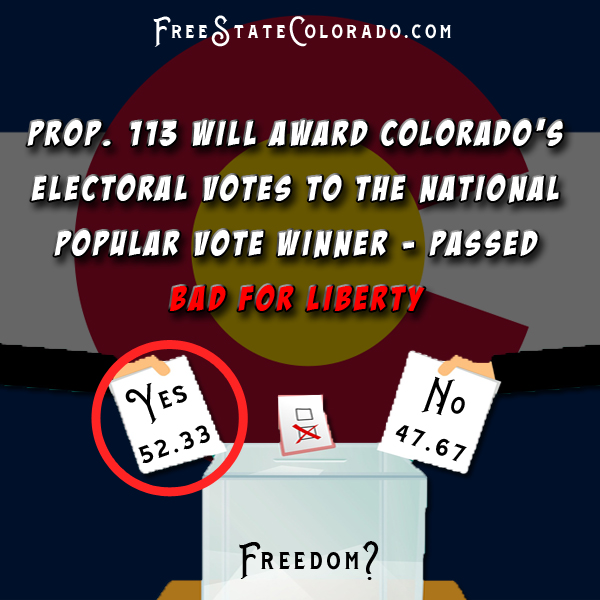
Reintroduction of Gray Wolves – Proposition 114 – Yes: 50.91% No: 49.09%

With only a 56,986 vote differential, gray wolves are now taxpayer funded in Colorado.
This nearly $800,000 per year program will give government bureaucrats the power to manage Colorado’s Gray Wolf population.
The biggest opponents of this measure was Colorado’s ranching community, who are concerned about the impact of gray wolves on their livestock.
Of course livestock will be killed by wolves, and 114 ensures that livestock owners are compensated for the death of their animals.
Those who supported the gray wolf government program were upset in October when the Trump administration removed gray wolves from the endangered species list.
Unfortunately, Joe Biden could add the wolves back to the list.
Big Spenders on this Initiative:
Two of the supporting groups of this initiative were:
Rocky Mountain Wolf Action Fund
Registered agent: Rachel Gordon
P.O. Box 461
Lafayette, CO 80026
303-570-5446
Colorado Sierra Club – Elect the Wolf
Beverly Jane Ard-Smith, Registered Agent
1536 Wynkoop St
Denver, CO 80202
303-861-8819
Rocky Mountain Wolf Action fund spent a whopping $2,250,000 in support of this initiative, and the Colorado Sierra Club spent over $320,000.
Richard Pritzlaff, Boulderite, and President of the Biophilia Foundation contributed $583,775 to Rocky Mountain Wolf Action.
Defenders of Wildlife, an organization out of Washington DC contributed nearly $350,000 to the effort.
Also interesting is that a Tim Ferriss of Austin, Texas and the Saisei Foundation is listed as contributing $100,000 to Rocky Mountain Wolf Action.
Libertarian Takeaway: Bad for Liberty. Gov’t managed wolf populations will cause damage to livestock, pets, and possibly people. Bureaucrats using our tax money to centrally plan how many wolves should be allowed to exist is the height of hubris. Activists should watch for problems caused by this program and the examples of gov’t waste that are destined to occur.
Green Counties are Where Proposition 114 Won, and Red Counties are Where it Lost:

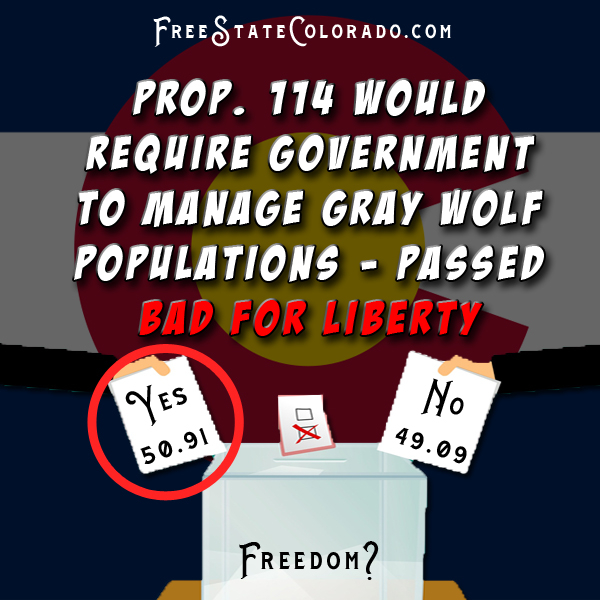
Lowering Income Tax Rate – Proposition 116 – Yes: 57.86% No: 42.14%

With 494,677 votes in favor of reducing taxes, this was a resounding victory for liberty!
The question for libertarian activists is, how much of an income tax reduction will Colorado voters support?
This tax decrease was very minor, from 4.63% to 4.55%. Providing only about $40 in savings to a taxpayer making $50,000 per year.
But, it will deprive the State of an estimated $78 million this fiscal year, and $158 million next fiscal year. (Source)
It’s also interesting to note that only four counties voted against lowering the State Income Tax: Denver, Boulder, Pitkin, and San Miguel. (See map below)
Big Spenders on this Initiative:
The individuals who pushed this initiative forward were Jon Caldera President of the Independence Institute and State Senator Jerry Sonnenberg.
Support came from Americans for Prosperity Colorado Issue Committee, and Energize Our Economy.
Americans for Prosperity is best known for being funded by the not-so-libertarian Koch family, and supporting relatively free market initiatives and candidates across the country.
Energize Our Economy is less well-known, but seems to be one of dozens of conservative and Republican groups setup by Katie Kennedy of Strategic Compliance LLC. (Search her name here to see who she works with)
Kennedy’s group accepted over $45,000 in in-kind contributions from the the non-profit Independence Institute in support of this initiative.
Unite for Colorado (also a Katie Kennedy group) seems to have footed the bill for the signature gathering, with a reported $510,000 spent in in-kind contributions towards the effort to get this on the ballot. (Unite for Colorado Action IEC spent a total of $2.3 million this year on different candidates and causes)
Against the measure was non-profit Protect Colorado’s Recovery (what a deceptive name!), and Fair Tax Colorado, both with the same registered agent, Rachel Gordon.
Gordon works with a number of Colorado’s Democratic candidates, (including being the primary registered agent for Colorado’s controversial Secretary of State), on a variety of initiatives.
Gordon’s RKG Development LLC (Presumably named after Rachel Kleinman Gordon’s initials), collected $146,446 this year alone from nearly all Democratic causes, such as wolf reintroduction, National Popular Vote, District Attorney candidates, State House candidates, etc. (source).
Fair Tax Colorado spent $762,942 on their failed efforts to stop the tax decrease. (source)
Protect Colorado’s Recovery spent over $2,000,000 this election cycle.
Gary Community Investment Company (who also spent big money on Amendment B as we saw earlier), contributed a cool $250,000 to Fair Tax Colorado.
The Colorado Fund for Children and Public Education footed most of the bill with $566,000 contributed to Fair Tax Colorado.
Colorado Fund for Children and Public Education’s registered agent Kathy Michienzi Rendon is also the registered agent of the Colorado Education Association, the biggest teacher’s union in the State.
The Colorado Education Association is on the biggest enemies of liberty in Colorado, as they spend millions in teacher’s union dues to fund efforts to increase state power.
Protect Colorado’s Recovery received most of their money from a variety of Washington DC donors: North Fund, $750,000, Sixteen Thirty Fund, $200,000, SEIU, $119,999, and the American Federation of Teachers, $25,000. (source)
These groups are heavy hitters for the Democratic Party’s national efforts.
Libertarian Takeaway: Good for Liberty! Colorado voters often vote with their pocketbook. And anything that deprives the State of power and money is a win. I would recommend that liberty activists familiarize themselves with groups that oppose tax cuts. These organizations are the power behind the authoritarian politicians. The passage of this tax cut is a good sign for future tax cuts.
Green Counties are Where Proposition 116 Won, and Red Counties are Where it Lost:

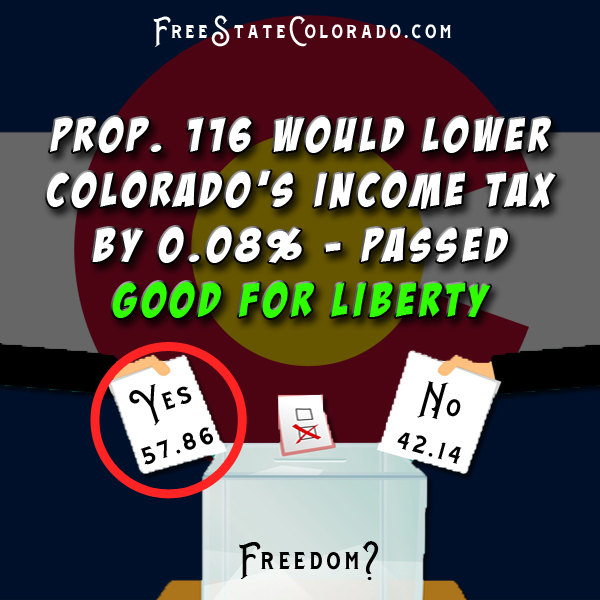
Voter Approval for Fees – Proposition 117 – Yes: 52.55% No: 47.45%

With only a 152,669 vote differential, this important and confusing ballot initiative passed in spite of widespread propaganda.
117’s passage is a testament to the spirit of The Taxpayer’s Bill of Rights (TABOR), which requires politicians to ask the voters prior to raising taxes.
TABOR is continually being circumvented by the Colorado Legislature, who pass laws creating “fees,” in lieu of taxes.
117 now requires the State Legislature to ask permission of the voters as to whether they can create a large State Enterprise, which can collect fees and spend taxpayer money.
Of course, the authoritarians who wish to control every aspect of our lives opposed this simple request for consent.
Big Spenders on this Initiative:
Supporting 117 was once again Americans for Prosperity Colorado Issue Committee, and Voter Approval of Fees.
Voter Approval of Fees has Michael Fields as their Registered Agent with the Secretary of State.
Michael Fields may be best known as the State Director of Americans for Prosperity Colorado, but is now the Executive Director of Colorado Rising Action.
Voter Approval of Fees spent $427,627 in support of 117, and had another $960,00 in non-monetary contributions to the group.
Unite for Colorado spent $471,000 for signature gathering to get 117 on the ballot.
Colorado Rising State Action spent $153,00 on mail programs for 117.
The Better Jobs Coalition also contributed $150,000 to the effort.
The Better Jobs Coalition has Rick Enstrom, of Enstrom Candy, and the Foothills Republican Club, as the registered agent.
Better Jobs Coalition is funded to the tune of $220,000 by Ready Colorado.
Against 117, were the same groups who were against 116, Fair Tax Colorado, and Protect Colorado’s Recovery.
Libertarian Takeaway: Good for Liberty! 117 makes it more difficult for the State to spend taxpayer money and interfere in the economy. Depriving the State of resources is a path towards freedom.
Green Counties are Where Proposition 117 Won, and Red Counties are Where it Lost:

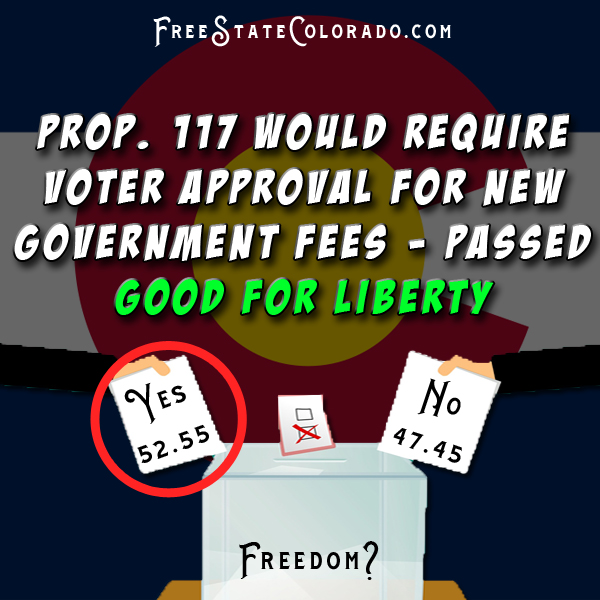
Proposition 118 – Paid Family Leave Welfare Program – Yes: 57.75% No: 42.25%
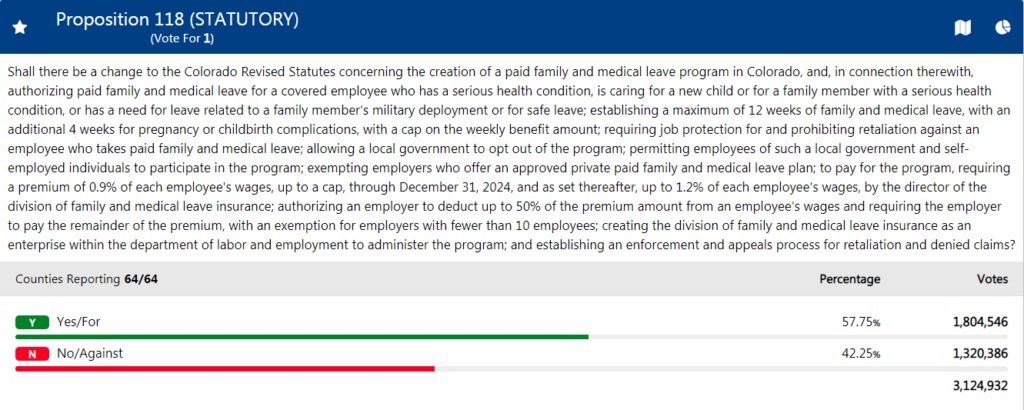
With 484,160 more votes in favor, 118 passed with a wide margin.
Paid Family Leave is a welfare program that will raise taxes on Colorado workers and employers.
Democratic activists have long sought Paid Family Leave.
According to the Legislative Council Staff, this initiative can be expected to increase state revenue by $1.3 billion for fiscal year 2023-24. (source)
By removing a billion plus dollars from the economy, employers will have less money to hire employees, and employees will have less money on their paycheck.
Political attempts to control the relationship between an employer and their employee are socialistic in nature.
Many employees will not need to use the welfare benefits of the Family Leave Program, effectively subsidizing other employees throughout the state.
The State will have enforcement power to ensure employers are adhering to this new program.
Qualifying events for Paid Family Leave Benefits include:
- An individual’s serious health condition;
- Caring for a newborn, an adopted child, or a child placed through foster care for the first year;
- Caring for a family member with a serious health condition;
- Circumstances related to a family member’s active military duty.
- Domestic abuse, sexual assault or abuse, and stalking are also
defined as safe leave for which a person may receive benefits.
For the first two years of the program, 0.90% of an individual’s wages will be paid into the program; the cost split 50-50 between the employer and employee.
After the first two years, the premium will be set to the “rate necessary to obtain a total amount of premium contributions equal to 135 percent of the prior year’s claims and 100 percent of the cost of administration.” (source)
This means that employers and employees may find themselves with substantial money stolen from them as the program’s costs increase.
Big Spenders on this Initiative:
Colorado Families First spent a whopping $8.2 million in support of this campaign.
The funding for Colorado Families First primarily came from North Fund ($4.4 million), Sixteen Thirty Fund ($2.9 million), The Fairness Project ($280,538), New Approach PAC ($250,000), and SEIU ($108,533). (source)
As we saw earlier, both North Fund and Sixteen Thirty Fund also spent big money attempting to defeat the income tax decrease.
The Registered Agent listed for Colorado Families First is Carmen Medrano.
Medrano is heavily involved in social causes in Colorado, and previously in California.
Medrano is currently the Exectutive Director of United for a New Economy, UNE, whose issues of interest include “immigration justice,” “economic justice,” “housing justice,” and “racial justice.”
Medrano has recently asked Governor Polis to extend his executive order banning evictions, and the State Legislature to allow rent control (or as she calls it, “rent stabilization”) and ban “housing discrimination.”
With 118 winning in November, Medrano and her colleagues are likely to ramp up their activism.
Medrano’s ideology is widespread among the Democratic Party members in Colorado, and it is disturbing for those of us who believe in freedom.
Another communist involved with Colorado Families First is anti-gun former State Senator John P. Morse.
Tyrant Morse was removed by voters in the famous Gun Rights Recall in 2013.
Another big supporter of 118, was AARP Colorado.
Many people do not know that AARP supports welfare programs like this one across the country.
Fighting against 118, was NO ON PROP 118: HIGHER TAXES, MORE BUREAUCRACY, A LAVISH, NEW PROGRAM DESTINED FOR BANKRUPTCY
No on Prop 118 spent nearly $800,000 in opposition to this effort.
No on Prop 118 received some of their funds from the Associated General Contractors of Colorado ($61,000), the Colorado Association of Commerce & Industry ($50,000), The Rocky Mountain Mechanical Contractors Association ($50,000), Colorado Concern ($50,000), and a variety of other industry organizations. (source)
Libertarian Takeaway: BAD for Liberty. Gov’t interference in the relationship between employers and employees dangerous and will only lead to increased poverty. The socialist activists behind this initiative have big plans, such as rent control and other social justice causes. Liberty activists should keep an eye on these efforts, and the increased premiums this legislation will cause starting in 2025.
Green Counties are Where Proposition 118 Won, and Red Counties are Where it Lost:

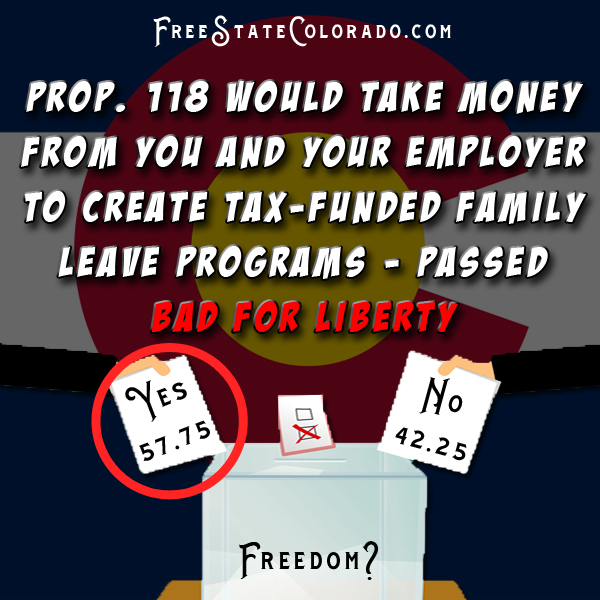
Ballot Initiatives that Failed:
Amendment C – Loosen Charitable Gaming Activities – Yes: 52.35% No: 47.65%

Amendments to the Colorado Constitution require 55% in the affirmative.
Unfortunately, Amendment C failed to pass this threshold.
Of the votes cast, C needed an additional 80,367 votes.
C would have been a good thing for liberty, allowing charities to more easily hold raffles and bingo events.
Green Counites are Where Amendment C Won, and Red Counties are Where it Lost:

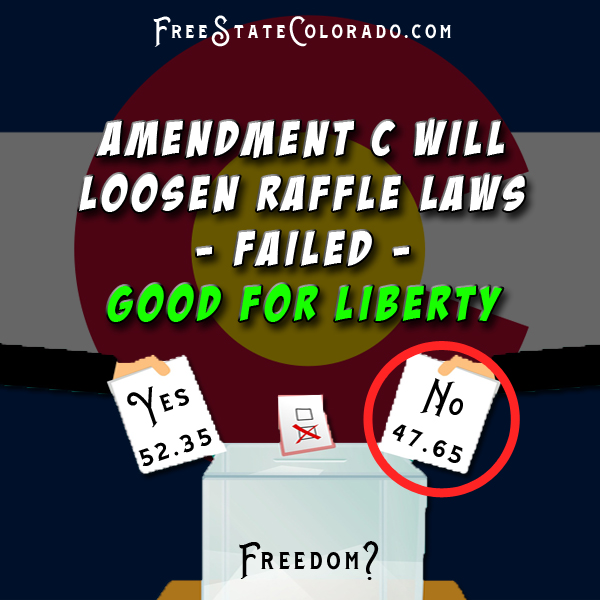
Proposition 115 – Late-term Abortion Ban – Yes: 41.01% No: 58.99%

With a 566,692 vote differential, Colorado remains one of 10 states that allow abortions up to the moment of conception.
Even though infants can survive after 22 weeks, voters did not want to restrict abortions.
Pro-life activists are likely to continue their efforts to reign in Colorado’s very liberal abortion laws.
Big Spenders on this Initiative:
Pro-abortion group, Abortion Access for All spent over $9.6 million.
Abortion Access for All received, $1.75 million from Planned Parenthood of the Rockies, $1.25 million from energy heiress Stacy Schusterman, $1.35 million from the North Fund, $535 thousand from Cobalt Advocates, $361 thousand from the ACLU, $212 thousand from Sixteen Thirty Fund, and $336 thousand from ProgressNow Colorado. (source)
Green Counties are Where Proposition 115 Won, Red Counties are Where it Lost:

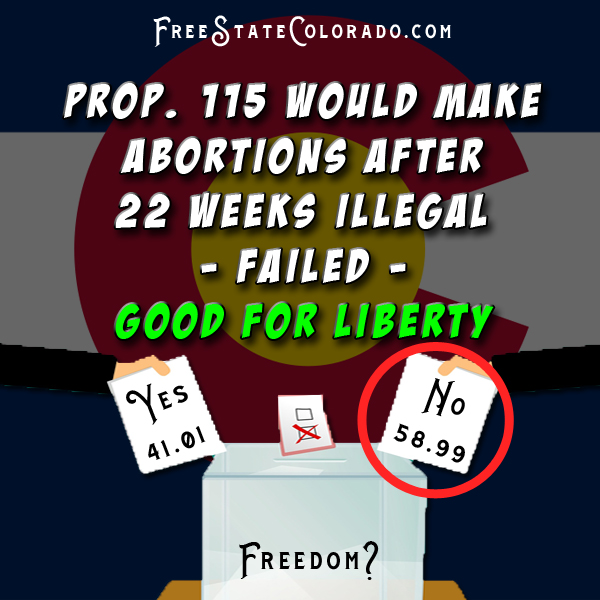
Key Takeaways for Liberty Activists
There is much potential for change through Colorado’s initiative process.
I would recommend looking at the counties where pro-liberty initiatives won.
Real progress can be made at the local level.
Colorado voters are very open to using ballot initiatives to change the law, only two of this year’s ballot initiatives failed to pass.
This year’s ballot initiatives sorted by margin of victory are:
- Tobacco Taxes, Proposition EE: 67.56%
- Only Citizens Can Vote, Amendment 76: 62.9%
- Increase Gambling Limits, Amendment 77: 60.54%
- Income Tax Reduction, Proposition 116: 57.86%
- Paid Family Leave, Proposition 118: 57.75%
- Property Tax Increase, Amendment B: 57.52%
- Voter Approval on Fees, Proposition 117: 52.55%
- Charitable Raffles/Bingo, Amendment C: 52.35%
- National Popular Vote, Proposition 113: 52.33%
- Gray Wolves, Proposition 114: 50.91%
- Abortion Ban, Proposition 115: 41.01%
Check out this recent article from the Colorado Sun on “Dark Money” spent this election cycle.
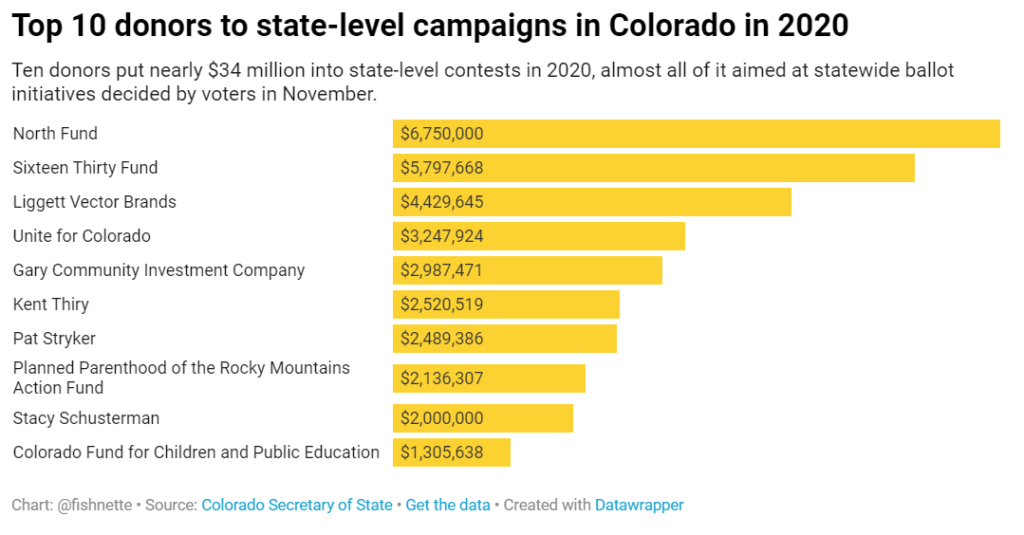
It’s encouraging to see that the reduction in State Income Tax passed with a wide margin, and there may be a possibility for further income tax reductions in the future.
It’s also important for liberty activists to be aware of who exactly is paying for these changes to our Colorado laws.
It was surprising for me to see the Only Citizens Can Vote Amendment 76 pass with a whopping 62%.
The citizenship question may be an avenue to restrict gov’t benefits or restrict the voting pool.
Additionally, libertarians may see luck pushing pro-gambling measures forward.
Libertarians should be optimistic for the future.
Tax decreases, expanded gambling, voter approval required, and other issues are where we can make ground.

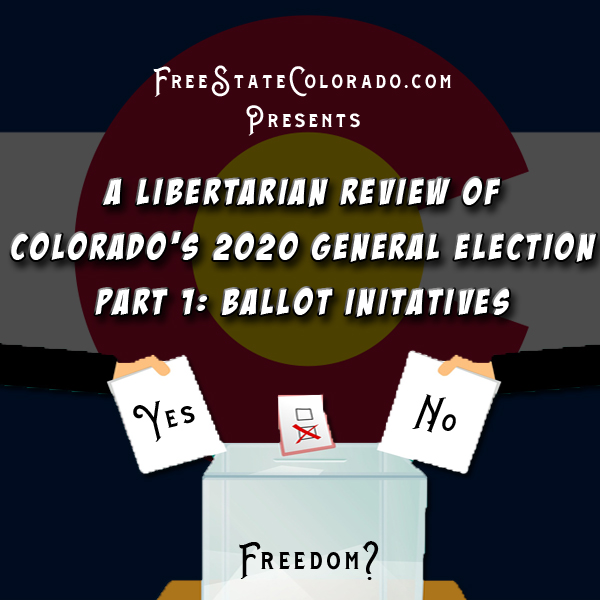

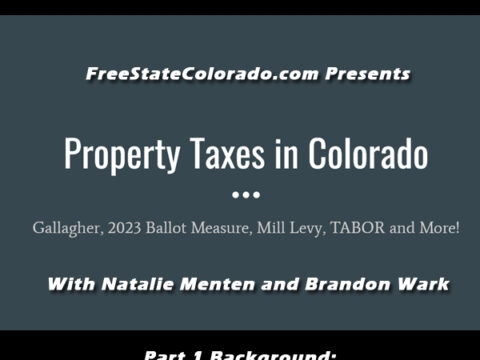
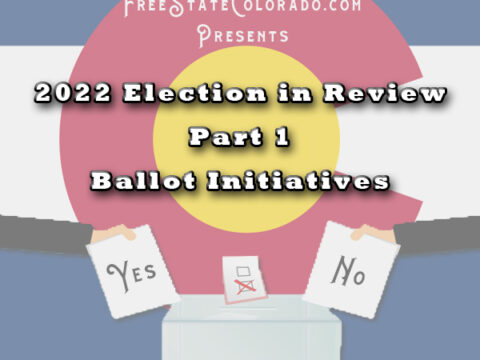
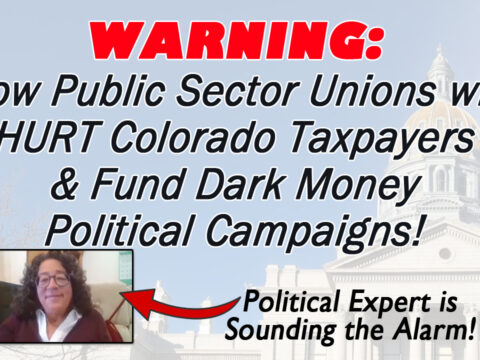
Recent Comments